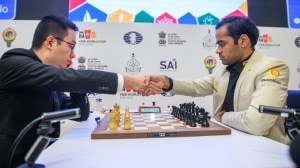UN sets preamble to stop output of fissile materials
GENEVA, Aug 12: The United Nations conference on disarmament (CD) today set the broad parameters for negotiations to begin a worldwide ba...

GENEVA, Aug 12: The United Nations conference on disarmament (CD) today set the broad parameters for negotiations to begin a worldwide ban on the production of fissile materials for nuclear weapons after Israel gave in to American urging and dropped its effective veto.
Diplomats said the outside limit for concluding the treaty was five years though they thought it could be ready in three. The CD now has a negotiating mandate to reign in fissile materials but the scope of what the treaty will include and exclude is expected to be the stuff of stiff negotiations resembling the CTBT.
Will the future treaty limit itself to banning production of plutonium and highly enriched uranium – fissile material for weapons production – or extend to existing stockpiles will be one of the hotly-debated issues when negotiations commence in earnest. The United States has pushed for the talks to cover just future production of fissile material, and not just stocks.
The future pact is seen by the West, including theofficial nuclear weapons powers – the United States, France, Britain, Russia and China – as the next step in multilateral nuclear disarmament that follows the controversial CTBT. The developing world including India however see a successful FMCT as being distinctively de-linked from the process of total and complete nuclear disarmament.
The 61-nation CD, in a decision that unblocked a three year old deadlock on the Fissile Materials Cut-Off Convention (FMCT) decided to negotiate a “non-discriminatory, multilateral and internationally and effectively verifiable treaty banning the production of fissile material for nuclear weapons or other nuclear explosive devices.” Immediately after today’s decision, the group of 21 developing countries that includes India conveyed their willingness to remain flexible over FMCT should be reciprocated by the West’s willingness to commence immediate negotiations on total and complete nuclear disarmament.
“As a nuclear weapons state, our commitment to pursuing globalnuclear disarmament in order to achieve a nuclear weapons free world remains undiluted, ” chief Indian negotiator ambassador Savitri Kunnadi told the CD ahead of today’s decision. China’s ambassador to the UN Li Changhe, speaking to reporters ahead of the decision said, “we are talking about prohibition of future production for fissile materials.” Asked whether the stocks might be covered, he replied, ” The matter has to be resolved through negotiations. If stocks are to be added, it depends on the solution.”
Under the pact, states would have to pledge to grant international inspectors access to uranium enrichment plants as well as facilities which reprocess spent uranium. While the P5 have been loathe to accept India as nuclear weapons state following its May tests, diplomats were quick to point out that India is now speaking at the CD as a nuclear weapons state, giving all the security assurances and guarantees that come with its new status. Kunnadi told the CD the only credible guarantee against theuse or threat of nuclear weapons lies in their total elimination. Until this objective is reached, nuclear weapons states (India included) had an obligation to assure those who didn’t have these weapons that the nuclear menace would not be used as an instrument of pressure, intimidation and blackmail.
“This obligation should be of an internationally legally binding character – clear, credible, universal and without discrimination,” Kunnadi told the CD as she welcomed the resumption of negotiations.
All the five official nuclear powers as well as India, Pakistan and Israel are members of the CD. Diplomats said the CD which ends it final session of this year on September 9 would aim soon to name a chairman to oversee the negotiations, possibly on Thursday.




- 01
- 02
- 03
- 04
- 05



























